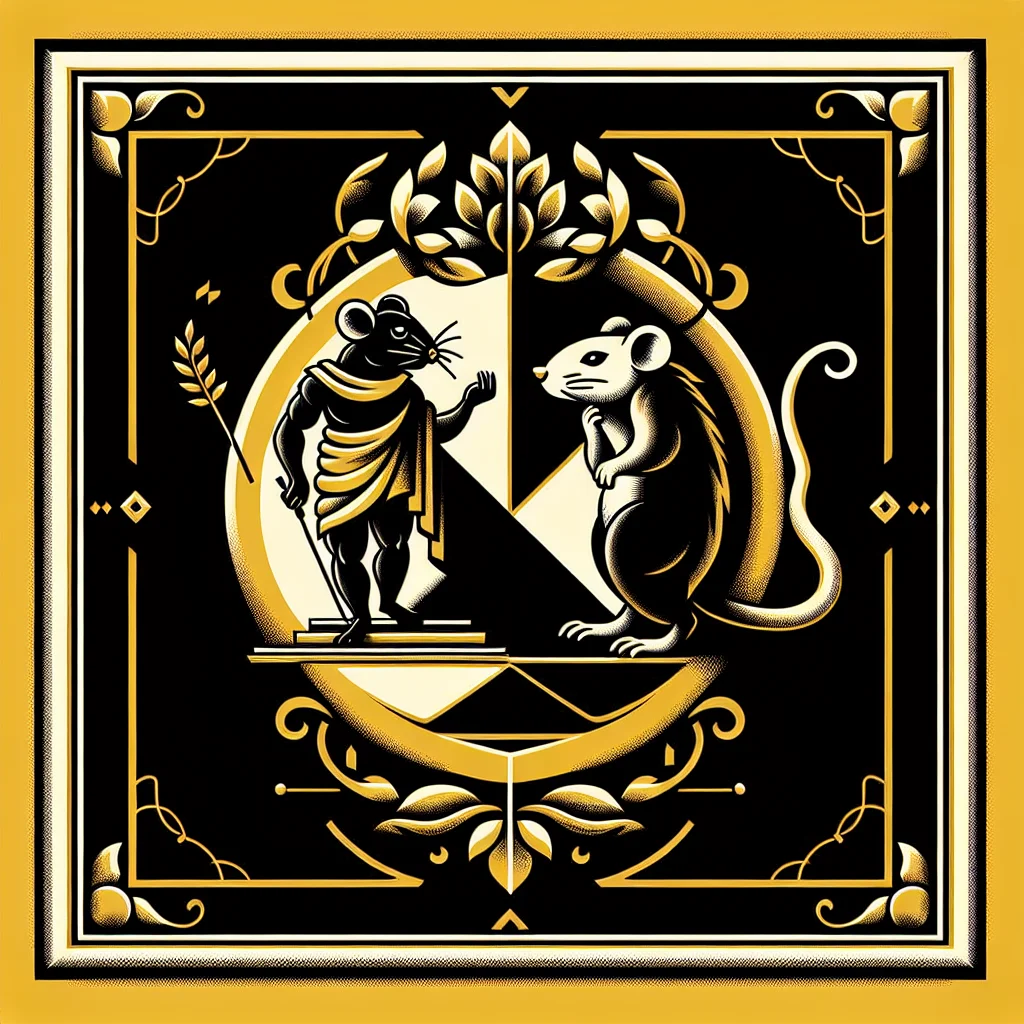3 minute read •
Comments
Clawdius the Brave: A Heroic Legacy or a Controversial Tactic?
March 6, 2025

In the annals of rat history, no name shines brighter than Clawdius the Brave—a legendary warrior whose bold leadership turned the tide during the Great Feline Incursion of the last century. Yet, controversy shadows his legacy, where heroism meets contentious strategy. Did his audacious tactics during the incursion save Ratopolis, or do they point to a darker side of his cunning?
Clawdius employed revolutionary guerrilla tactics and psychological warfare, strategies that modern rat military forces still scrutinize and adapt. Through decoys and misinformation, he outsmarted foes, crafting a defense against feline domination. Yet, the moral implications of such maneuvers remain a topic of heated debate.
The Great Feline Incursion, marked by tensions and territorial threats, underpins his famous exploits. Ratopolis flourished under Clawdius's fierce protection, yet his methods invite criticism. “Clawdius was a whisker ahead of his time, but not every rat agrees with his methods,” says historian Whiskerstein, pointing to the lingering division over his tactics.
In rat culture, Clawdius's dual legacy reverberates through literature and folklore, inspiring tales of valor and cautionary anecdotes alike. “He was a hero, no doubt, but some say he was too cunning for his own good,” remarks local elder, Tailia, highlighting how opinions diverge even among those who revered him.
Young military strategist Squeakson adds, “Clawdius's tactics were sharp as his claws, but they left a mark that some find hard to erase,” illustrating how Clawdius's strategies, while effective, left an ethical conundrum. As a society, understanding this legacy necessitates examining both praise and criticism of his approach.
Aside from military genius, Clawdius’s personal life offers intriguing anecdotes that color his character with relatable hues. Often told are tales of his love for music and vibrant community gatherings, humanizing the hero who stood at the forefront of a vital victory.
In rat education, Clawdius is a fixture, prompting debate on heroism and ethics. School lessons explore his dual legacy, imprinting enduring lessons on curious young minds. These discussions mirror wider societal conversations about how we reflect on figures who shaped history both positively and through controversial means.
Comparisons with other historical figures, like Sir Scratchalot, reveal a common narrative of complex legacy. While many figures are celebrated, their shadows of controversy teach valuable lessons in moral complexity.
Clawdius’s legacy challenges us to weigh heroism against hindsight. As the rattling drum of history echoes, it asks whether we blindly laud victory or scrutinize the means by which it was achieved. In doing so, it urges us to consider how history's gaze shifts, intersecting honor with responsibility and past with present.
In recognizing Clawdius the Brave as both a hero and a paradox, we delve into what defines greatness and its price. We’re called to confront the human—or in this case, rat—tendency to romanticize valor while questioning the silent whispers of strategy and ethics. As Ratopolis defines its cultural narrative, it reflects on Clawdius’s legacy, perpetuating a critical dialogue in its ongoing tale and that of its exemplary sons and daughters.
Clawdius employed revolutionary guerrilla tactics and psychological warfare, strategies that modern rat military forces still scrutinize and adapt. Through decoys and misinformation, he outsmarted foes, crafting a defense against feline domination. Yet, the moral implications of such maneuvers remain a topic of heated debate.
The Great Feline Incursion, marked by tensions and territorial threats, underpins his famous exploits. Ratopolis flourished under Clawdius's fierce protection, yet his methods invite criticism. “Clawdius was a whisker ahead of his time, but not every rat agrees with his methods,” says historian Whiskerstein, pointing to the lingering division over his tactics.
In rat culture, Clawdius's dual legacy reverberates through literature and folklore, inspiring tales of valor and cautionary anecdotes alike. “He was a hero, no doubt, but some say he was too cunning for his own good,” remarks local elder, Tailia, highlighting how opinions diverge even among those who revered him.
Young military strategist Squeakson adds, “Clawdius's tactics were sharp as his claws, but they left a mark that some find hard to erase,” illustrating how Clawdius's strategies, while effective, left an ethical conundrum. As a society, understanding this legacy necessitates examining both praise and criticism of his approach.
Aside from military genius, Clawdius’s personal life offers intriguing anecdotes that color his character with relatable hues. Often told are tales of his love for music and vibrant community gatherings, humanizing the hero who stood at the forefront of a vital victory.
In rat education, Clawdius is a fixture, prompting debate on heroism and ethics. School lessons explore his dual legacy, imprinting enduring lessons on curious young minds. These discussions mirror wider societal conversations about how we reflect on figures who shaped history both positively and through controversial means.
Comparisons with other historical figures, like Sir Scratchalot, reveal a common narrative of complex legacy. While many figures are celebrated, their shadows of controversy teach valuable lessons in moral complexity.
Clawdius’s legacy challenges us to weigh heroism against hindsight. As the rattling drum of history echoes, it asks whether we blindly laud victory or scrutinize the means by which it was achieved. In doing so, it urges us to consider how history's gaze shifts, intersecting honor with responsibility and past with present.
In recognizing Clawdius the Brave as both a hero and a paradox, we delve into what defines greatness and its price. We’re called to confront the human—or in this case, rat—tendency to romanticize valor while questioning the silent whispers of strategy and ethics. As Ratopolis defines its cultural narrative, it reflects on Clawdius’s legacy, perpetuating a critical dialogue in its ongoing tale and that of its exemplary sons and daughters.
Comments